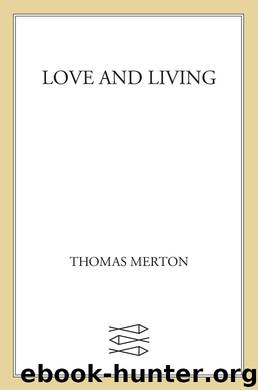Love and Living by Thomas Merton

Author:Thomas Merton
Language: eng
Format: epub
Publisher: Farrar, Straus and Giroux
Published: 2011-08-07T16:00:00+00:00
V World
Christians are now asking themselves curious questions about something called the “world.” Should they revile it as their fathers did? Should they renounce it as monks do? Should they love it as it loves itself? Should they enter into dialogue with it, as the Pope has dialogues with all kinds of people not excluding Russians? Or, in the long run, should they frankly admit that they are part of the world and start from there? What is this world? Does it exist at all?
We must begin by frankly admitting that the first place in which to go looking for the world is not outside us but in ourselves. We are the world. In the deepest ground of our being we remain in metaphysical contact with the whole of that creation in which we are only small parts. Through our senses and our minds, our loves, needs, and desires, we are implicated, without possibility of evasion, in this world of matter and of men, of things and of persons, which not only affect us and change our lives but are also affected and changed by us. From the moment we sit down at the table and put a piece of bread in our mouths, we see that we are in the world and cannot be otherwise than in it, until the day we die. The question, then, is not to speculate about how we are to contact the world—as if we were somehow in outer space—but how to validate our relationship, give it a fully honest and human significance, and make it truly productive and worthwhile for our world.
Yet at the same time we must also recognize that we are all able to distinguish between ourselves and the world, since we are all capable of recognizing the mystery of our own subjective identity. Furthermore, we intuitively grasp the fact that this identity affirms and builds itself by a kind of dialectic of love, understanding, work, and communion with the “rest of the world.” It is, in fact, essential to human consciousness to begin with the distinction between “I” and “all the rest of the world,” and as everyone keeps pointing out since Martin Buber, this must grow and resolve itself into an “I-Thou” relationship with the other. Without this perfection of dialogue and love, the “I” will be forever deprived, alienated, and isolated in a world that is either hostile and incomprehensible or totally devouring.
It would be interesting to trace the whole history of this concept of a temporal material world to which man felt free to oppose himself, which he could stand against, from which he could separate himself, declare himself free, against which he could choose to act, or which he was able to parley with. It doubtless goes back to the great discovery of personal identity and freedom in the age of the Greek city-states, of the Hebrew Prophets, of Buddha and Zoroaster, of Confucius and Lao-tse. Not that all these had the same concept of “the
Download
This site does not store any files on its server. We only index and link to content provided by other sites. Please contact the content providers to delete copyright contents if any and email us, we'll remove relevant links or contents immediately.
Resisting Happiness by Matthew Kelly(3337)
The Social Psychology of Inequality by Unknown(3022)
Day by Elie Wiesel(2781)
Designing Your Life by Bill Burnett(2741)
The Giving Tree by Shel Silverstein(2337)
Human Design by Chetan Parkyn(2068)
Angels of God: The Bible, the Church and the Heavenly Hosts by Mike Aquilina(1964)
The Supreme Gift by Paulo Coelho(1963)
Jesus of Nazareth by Joseph Ratzinger(1811)
Hostage to the Devil by Malachi Martin(1802)
Augustine: Conversions to Confessions by Robin Lane Fox(1770)
7 Secrets of Divine Mercy by Vinny Flynn(1741)
Dark Mysteries of the Vatican by H. Paul Jeffers(1718)
The Vatican Pimpernel by Brian Fleming(1700)
St. Thomas Aquinas by G. K. Chesterton(1634)
Saints & Angels by Doreen Virtue(1604)
The Ratline by Philippe Sands(1572)
My Daily Catholic Bible, NABRE by Thigpen Edited by Dr. Paul(1499)
Called to Life by Jacques Philippe(1478)
